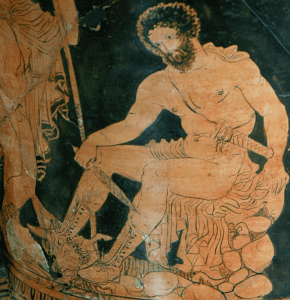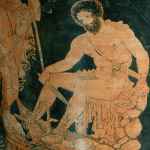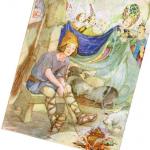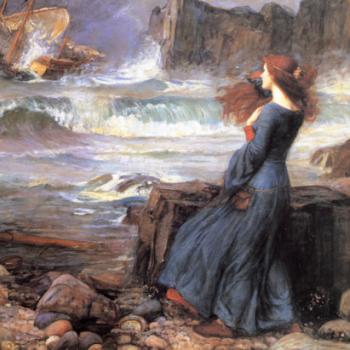 The lure of secret knowledge destroyed Poe, warped Lovecraft, wounded Machen,and left Charles Williams less than he might have been. We might recollect the dead, pray for them, ask for their prayers, but it is never wise to seek them out.
The lure of secret knowledge destroyed Poe, warped Lovecraft, wounded Machen,and left Charles Williams less than he might have been. We might recollect the dead, pray for them, ask for their prayers, but it is never wise to seek them out.
The Bible’s King Saul looked the part of king and fought hard to maintain his nation’s liberty against the more technologically advanced Philistines. He had some success, attracted talent to his court, and then grew jealous of his superstar commander: David. He also alienated the prophet Samuel by trying to combine the roles of king, priest, and prophet. Cut off from divine knowledge, he sought the dead to discern the future. The news was not good and the next day his battle lost, his heir killed, King Saul took his own life rather than fall a prisoner.
Calling up Hades rarely ends well, certainly when there is a heavenly alternative. The dead do not exist at our beck and call, having no reason to be an infernal Google of the future. This is wise enough that it is a feature of the best folklore. Wisemen don’t hasten to chat with the dearly departed.
Homer’s Odysseus is no exception. He is a man who always has found a way, but the sea god Poseidon finally drains him of all ways but one: get a plan from the dead in Hades. Odysseus finds a way, but the way planned by the dead ends badly. The dead Elpenor , hapless, witless drunk, bargains for a big funeral despite having killed himself through dispensing with the ladder in getting off a roof.
Odysseus learns the truth and the truth does not help him whatsoever. Homer is wise enough to know that even full instructions of what not to do cannot help me driven by their nature. Warn a glutton to eat less and he will still stuff himself. Warn about the future, even in no uncertain terms, and the hero will avoid evil, because he would have anyway due to his nature, while any fools around him will be destroyed.
Knowledge, the damned know, does not set a man free. Knowledge they have aplenty in Hades, but the good of the intellect, the ability to do something requires a good will. Homer shows that even in death Agamemnon remains self-centered and clueless about his own errors. Achilles is sad, because that is what Achilles does. Ajax, plodding dullard, still chewed on the loss of armor to Odysseus that would be useless to him if he had it.
A Christian agrees, but more hopefully. God is a good will and total knowledge combined with total power. Heroes imitate God, but fools can know the doom of men and still choose badly. Homer suggested what Scripture reveals: knowing the truth without being able to incarnate the truth will kill you.
The “way” given to Odysseus by the dead is useless, a repetition of what he knows with some added details of what he knows already that helps nobody. The hero chooses well, but his gods are perverse and choosing well does not help. Odysseus ends up trapped, tormented, without a way home. If you end up with no way forward but to call on the dead, then only the gods can save you ultimately. Odysseus plays out his options, talking to the dead prophet, and luckily for him his gods do help.
The philosophers, Plato especially, saved Hellenism and Rome from polytheism and atheism as the only options. He posited a good God and what Plato suggested God revealed in the person of Jesus Christ. Still, even before Christ, the Romans could hope for something better of the afterlife.
The Christian Dante imitates Roman Virgil and goes to Hades, but Homer’s hero Odysseus merely calls up the dead. The Romans and the Christians both view Hades as a place while the shades of Homer are much more insubstantial, breaths of wind that feed on blood. As Achilles says to Odysseus, any life is better than even a hero’s life in Hades: hope is a cheat in Homeric polytheism, not a virtue. There are not happy endings in early Greek mythology. Even those that become gods, the apotheosis of Heracles is the best case, only join the endless deathlessness of meaningless existence. So inappropriate was this endless deathlessness for men that Heracles has a shadow of a shade still in Hades. The man became a god, but the man’s shadow lumbers through hell. All the while, Fate, the shadowy hint of monotheism in Homer, will someday replace even these Olympians and they too will go to some exile someplace to do something. . .It is no wonder that Odysseus turns down immortality. Better a hopeless hero in a man’s Hades, than a demigod waiting for the twilight of your particular generation of deities.
No wonder some philosophers turned to atheism: better nothing that Homeric eternity. The dead in themselves know things, but they are not helpful to us. The good news is that Hope is good and not a cheat. Eternity can be endless life and that more abundantly. Ultimately we look to God, hope in God, trust in God to keep us now and at the hour of our death, and beyond.













